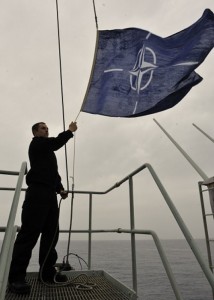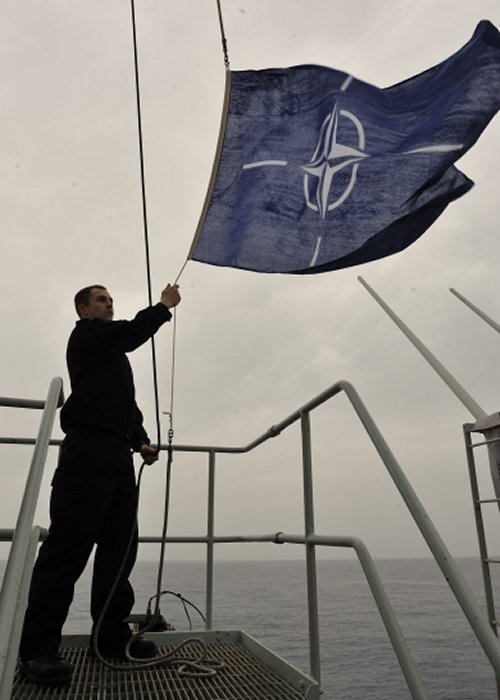Operation Odyssey Dawn comes under NATO command. Well almost…

(BRUSSELS2) Even if the French authorities do not want to admit it openly, we seem to be heading towards an agreement to allow almost total management of No Fly Zone operations and air strikes ("protection of civilians") by the NATO? In any case, everything suggests it. Admittedly, the meetings followed one another at NATO. Rather stormy judging by the various information that transpires. The doors have been slamming in recent days. And, in turn, Germany, France or Turkey have known "bargains" and "sweet words". The Secretary General, AF Rasmussen, has been working hard for several days to achieve his goal: to put the operation back in line with NATO. But the discussion was really anything but friendly. Besides, the discussions at the European Union could "almost seem courteous" says an expert familiar with the matter.
Strong pressure from all sides
The pressure was, in fact, very strong both on the side of the countries involved in the military coalition and on those who are hostile to it for NATO to get involved. In summary...
On the side of the coalition, several countries have stressed that NATO is the only possible framework for their involvement in the operation (Italy, Greece, Denmark, Norway, even Belgium...), Norway even going so far as to suspend its participation as long as no "clear" command solution has been found. As for the Americans, they want to disengage from the operation without leaving behind a coalition led by the Europeans (and the French). The British, circumstantial allies of the French, follow, they are determined above all to preserve their "privileged" link with the United States and to strengthen the Atlantic Alliance.
On the side of those reluctant to military action, Turkey, which refuses any military strike on an Arab and Muslim country and a political solution, has blocked the NATO operation. But plays other cards behind the scenes (see below). As for Germany, which does not want to be involved directly or indirectly in a military operation, and considers military strikes ineffective and counter-productive, it is not opposed to referral to NATO. On the contrary, she claims it. According to our information, it thus did not oppose the operation plan (OpPlan) of the "No Fly zone" nor that on the control of the arms embargo, even if it took over command of all his ships in the Mediterranean.
France rather isolated
As a result, France, in favor of maintaining the autonomy of the coalition's action for reasons that are both operational (not to allow countries reluctant to strike to take power) and political (to avoid a Western side "crusade" in the operation) while avoiding the extension of NATO on the southern shore, had to give way. In a few days, we went from an operation "led in coalition"to an operation"conducted with NATO support under coalition control"then to an operation"where NATO will have a key role". A shift that is not only semantic but also harbors political and operational consequences.
The NATO chain of command, a "NAC +" and/or a contact group
In fact, the NATO chain of command would thus be fully preserved: from SHAPE with Admiral Stravridis to the JFC in Naples which will serve as OHQ/FHQ - under the authority of Admiral ... Lockwear (US), who is already commanding the coalition operation, and Lt General Bouchard, his Canadian deputy. On the air side, it would be the center of Izmir (Turkey) which could be designated to structure the "No Fly zone". Which would be the de facto integration of Turkey into the system.
Political management is the delicate point of the system. Some wanted NATO to take political control of the operation, France wants to retain the strategic autonomy of the countries in favor of the intervention (and its own). The solution of a NAC+, extended to external contributing countries (such as Qatar) was the solution advocated by the former. France's preference was for the solution of political leadership totally separate from NATO. With the establishment of a "contact group" bringing together the countries participating in the operation (the first meeting takes place on Tuesday in London). The liaison and the role of the NAC, in this case, must still be clarified.
* It should be noted that the "Odyssey Dawn/Harmattan" operation in fact brings together two operations with different objectives and legal bases: the No Fly Zone and the Protection of Civilians (which obey two separate chapters of UN Resolution 1973). Differentiated solutions can be found for each of these two operations. Not to mention pragmatic solutions that could enable France to maintain a certain autonomy of tactical action, in certain geographical areas or certain objectives (a kind of caveat Upside down).
* A senior French diplomat confirmed that we were moving towards this solution: an NAC+ for the "no fly zone" and a contact group for the "protection of civilians" operation. The two operations are in any case coordinated and centralized by the NATO HQ in Naples, a sort of control tower for the sixty planes which will take part in the operation.
Behind this thread...
Other hard and stumbling interests
Apart from the great geostrategic ideas, there are hard and stumbling interests, particularly on the side of the United States and the United Kingdom. Involving NATO also means ensuring that they will not be the only ones to pay but that all countries will contribute up to their commitment. On the side of the Secretary General, AF Rasmussen, this hides the fact that the NATO budget will not be kept within as narrow budgetary margins as desired. As an operation generates expenses, it may be logical to vote for a budget extension, or at the very least to loosen the budgetary vice.
The aftermath of the Lisbon summit
And, above all, there is the follow-up to the NATO Lisbon summit, with the commitment to reduce personnel, the number of bases, and a new distribution of commands. A decision should be made before June at the latest. The number of component headquarters should be halved. We go from 6 to 3. If we know that on the maritime side, Naples (Italy) and Northwood (United Kingdom) are in competition, that on the air side, Ramstein (Germany) and Izmir (Turkey) are in "competition", if we know that among the three commands of Brunssum (Netherlands), Naples (Italy) or Lisbon (Portugal - commanded by a Frenchman), one must also disappear, ... we understand certain positions better. Some are apparently tough but open to negotiation (Turkey), others reluctant to the operation at first but then enthusiastic (Italy) or full of hesitation (Germany). In the end, Germany could have lost Ramstein and Italy secured one of the commands in Naples (for the JFC).
- What to remember from the NATO summit
- Gen. Abrial: “A lighter, more efficient alliance”. The “real” debate begins
- NATO. Objective: to degrease the mammoth…
(Updated 23 p.m., differentiated operation, and 1 a.m., senior diplomat)

